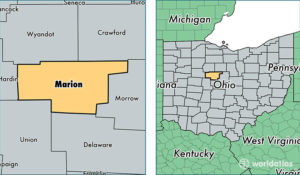Marion County Bail Bonds
About Marion County Bail Bonds
It is common for people to not know what to expect regarding Marion County bail bonds until they or a loved one is arrested. As such, they often ask the same questions about bail, the bonding process, and the associated costs. Here, we attempt to provide general answers to the most asked questions to our Marion Bail Bondsman!
Local Marion County Bail Bondsman Near You
Call (740) 602-2428

Derrick Evans Local Marion Bail Bondsman!
24/7 365 days a year!
How Bail Is Set
Judges are responsible for setting bail. Because many people want to get out of jail immediately, most jails have standard bail schedules that specify bail amounts for common crimes. An arrested person can often get out of jail quickly by paying the amount set forth in the stationhouse bail bond schedule. If there is not a bail bond schedule for their alleged crime a judge will set a bail amount in the arraignment hearing. In deciding whether to release the defendant pending completion of the case, courts primarily consider:
- whether the defendant is a danger to the community
- the defendant’s criminal record
- the defendant’s ties to the community (how long he has lived in the community and whether he has family nearby)
- whether the defendant is employed in the community and for how long, and
- whether the defendant has any history of failing to appear for court.
The following are options that may be available to the court in deciding conditions of release:
- Release on the defendant’s own recognizance. Being released on your own recognizance (“ROR” or “OR”) means you are released on the basis of your promise to report for trial and any other court proceedings in your case. Courts usually release defendants ROR only in minor criminal cases or when the defendant has a minimal record of prior criminal offenses if any, and a permanent local address and employment.
- Bond or bail. If the judge requires that a defendant post bond or bail, the defendant must post money with the court in order to be released pending completion of the case. The court can require a cash/surety bond or a deposit bond. If the bond is cash/surety, for instance, $10,000 cash – the defendant must post that amount with the court. Once the case is completed, the money is refunded, less any fees the court requires. If the court allows a surety bond, a bondsman or bail bondsman is permitted to post a surety note for the entire bond amount with a contract that the bondsman will pay the balance of the bond if the defendant does not appear for court and cannot be located. The defendant must pay the bondsman a nonrefundable portion of the bond (ten percent) and provide collateral – such as a deed to a home or other piece of real estate – or a co-signor, or both, to guarantee his appearance. If the defendant disappears and the bondsman is required to pay the bond to the court, the bondsman can collect that money from the co-signor or take possession of the collateral.
- Other conditions. In addition to ROR or requiring the defendant to post bail, the court can impose other conditions of release on the defendant, including no contact with witnesses, no use of drugs or alcohol, no association with other defendants, no new arrests, no association with known criminals, no possession of weapons, and no travel outside the county or state. If the defendant violates any of these conditions, the court can rescind the ROR or bond and hold the defendant without bond.
- Supervised release. In addition or as an alternative to setting a bond or other conditions of release, the court can place a defendant in a supervised release program while his case is pending. In some states, this is known as pre-trial supervision and is similar to being on probation while your case is pending. You will be required to report to a probation or other supervising officer and to comply with any conditions the officer sets such as the conditions listed above.
If the defendant cannot pay the bail amount on their own, they can seek help from a Marion County Bail bondsman in the form of a Bail Bond. To post a Marion Bail Bond, a defendant is required to pay 10% of the bail amount. If the defendant can not pay all 10% Sly Bail Bonds can take as little as 4% down and payments on the balance. If it is a large bond you may have to provide some sort of collateral. Co-signing a Marion bail bond means that you sign a promissory note or an indemnity agreement financially obligating themselves to pay the full amount of the bond if the accused person does not appear in court.
Bailed-out suspects commonly must comply with “conditions of release.” If a suspect violates a condition, a Marion County Judge may revoke bail and order the suspect re-arrested and returned to jail. Some bail conditions, such as a requirement that a suspect “obey all laws,” are common. Other conditions may reflect the crime for which a suspect was arrested. For example, a condition may order a domestic violence suspect not to contact the alleged victim.
What happens next depends on if the defendant appears in court after being released.
- If the defendant fails to appear in court: The Bail Bond is forfeited and the court requires the remaining 90% of the bail to be paid. The Bail Bondsman will have to pay the court the other 90% to the court.
- If a defendant does appear for court: Upon conclusion of the court case, the Bail Bond is dissolved and the collateral is returned to the person who posted it. The Bail bondsman keeps the 10% cash fee as profit.
Conditions of Bail
Bailed-out suspects commonly must comply with “conditions of release.” If a suspect violates a condition, a judge may revoke bail and order the suspect re-arrested and returned to jail. Some bail conditions, such as a requirement that a suspect “obey all laws,” are common. Other conditions may reflect the crime for which a suspect was arrested. For example, a condition may order a domestic violence suspect not to contact the alleged victim.
Marion is the county seat!
222 West Center Street
Marion, OH 43302
Courts we do bail bonds in Marion Couty:
- Marion County Court of Common Pleas, Family Division
- Marion County Court of Common Pleas, General Division
- Marion County Court of Common Pleas, Probate Division
- Marion County Municipal Court

Cities and Towns serviced with Marion County Bail Bonds:
Caledonia*
Green Camp*
La Rue*
Marion*
Morral*
New Bloomington*
Prospect*
Waldo*
Air View Acres
Bellaire Gardens
Big Island
Brush Ridge
Buckeye Trailer Park
Carpenters Corners
Centerville
Chateau Ridge
Claridon
Colonial Acres
Country Club Hills
Crystal Lakes
DeCliff
Eagle Creek
Eaglewood
Espyville
Fountain Place MH Park
Gast Corner
Grandview Estates
Harrys Trailer Park
Highlands of Marion
Hunters Chase
Kirkpatrick
Lynn
Martel
Meeker
Newmans
Oak Knoll
Oakland MH Park
Owens
Pleasant Acres MH Park
Quarry Estates
River Valley Estates
Ruth
Smith Corners
Southern Estates
The Groves At Newmans Crossing
Tobias
Twin Oaks MH Park
Wood Valley
Yorkshire Terrace
Marion County, OH – Standard ZIP Codes
43302 | 43314 | 43315 | 43323 | 43326 | 43332 | 43337 | 43341 | 43342 | 43344 | 43356 | 44833 | 44849
Marion County, OH – PO Box ZIP Codes (NO DEMOGRAPHIC DATA)
43301 | 43322 | 43335
Marion County Common Pleas Court
Local Court Forms
Marion County
222 West Center St.
Marion, OH 43302
Marion County Probate Court
Judge Deborah A. Alspach
Phone (740)223-4060
Fax (740)382-3798
Marion County Probate Court
Judge Thomas K. Jenkins
Phone (740)223-4260
Fax (740)223-4269
Julie M. Kagel, Clerk of Courts
100 North Main Street
Marion, Ohio 43302
Phone: (740) 223-4270
Fax: (740) 223-4279
